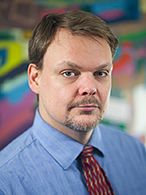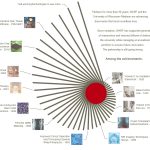Kevin Walters – “Think Local, Act Global: The Wisconsin Alumni Research Foundation and the Soil of the Wisconsin Idea”

Kevin Walters is a Historian and Strategic Research Coordinator for the Wisconsin Alumni Research Foundation (WARF) and a PhD Candidate in the UW- Madison History Department. Although much of his family comes from the Midwest, he grew up in Temple, Texas and attended the University of Texas at Austin as an undergraduate. He came to Madison after completing an MA in Humanities and an MA in History from the University of Texas at Dallas.

As requested by the audience, here’s a link to the interactive spiral graphic with WARF’s notable inventions. Click on the individual inventions or center dot to find out more. WARF calls it “Success Stories.”
For further information, here is a link to the WARF video “Cycle of Innovation”
Click here to view actual lecture from September 19th.
Assigned Readings:
Link to blog – Decade by Decade: Key Events from Each Decade of WARF’s History
You are welcome to leave comments about this lecture or topic below. Please note these are moderated – no off-topic or inappropriate comments will be allowed. Please remain respectful. We reserve the right to delete any that are not deemed appropriate.
Has video of lecture been posted?
I’m sorry, but it takes about a week to get the lectures posted here. Please be patient. Thank you.
Each lecture is also Livestreamed Tuesday evenings at 7 p.m. at https://www.biotech.wisc.edu/events.
This week, Kevin Walters spoke about “WARF and the Soil of the Wisconsin Idea”. Much of his talk was centered around the history of the Wisconsin Alumni Research Foundation (WARF) and its relationship to the Wisconsin Idea. WARF is known as a technology transfer office, which means that it is an independent, supporting organization that gives its profits to the University of Wisconsin-Madison. WARF is also one of the oldest technology transfer offices in the world! This foundation was created with the help of lawyers and financers. The goal of this group of individuals was to create an endowment that would provide long-term income for the University. However, there was not universal support for WARF and the use of patents by members of the University. One example of this was Babcock, who did not patent his butterfat test which resulted in poor replicas of his efficient model. Birge, the president of the University at the time Steenbock was interested in patenting his irradiation process, simply wanted the patent to “go away”. Nonetheless, the support for the WARF was strong enough that the foundation was created.
Walters shares that WARF was created because “many people argued and deeply cared” about the mission of the foundation. WARF is unique in that because it is a supporting organization, alumni are being asked to continue to serve the University through the foundation, drawing them back. Kevin Walters included a slide in his presentation that included a map of the United States that depicted the college loyalties of every county in each state. From what I could see, every county in Wisconsin unanimously supported the University of Wisconsin-Madison most. Walters finished his presentation by sharing “the people who come here [the University] remember this place, even when we travel globally.”
After the second lecture in this lecture series, I am still left wondering how the Wisconsin Idea is distinctly different than the missions of other universities. Is the significance seen in the map of college loyalties – that people who come to UW have a loyalty to the University and state for the rest of their lives? I understand that there is not an easy answer to this question. Do you have any idea what this point in the University’s history will look like when the Wisconsin Idea is talked about one hundred years from now? Who are the contemporary administrators and campus employees who will be held in the same regard as Babcock, Steenbock and La Follete, among many others? In the photo of the Fibonacci sequence filled with UW’s WARF accomplishments, it was noted that most of the accomplishments were related to biology/chemistry/life sciences. Do you see the potential for there to be a shift in the support that WARF provides for other sorts of advances in research – such as research in the social sciences like anthropology or sociology? These are questions that are difficult to answer, but left my mind spinning after leaving the great talk by Kevin Walters on Tuesday, September 19th.